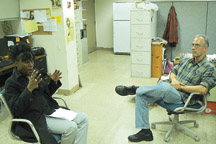A major determinant of a successful school system is the high school graduation rate.
By that standard, the Jersey City school district would get a failing grade, because the state Department of Education found that in the 2007-2008 school year, about three out of four students passed high school, or 74 percent. That is far below the state average of 92.8 percent.
Four of the city’s six high schools – Snyder, Lincoln, Ferris and Dickinson – had graduation rates for that period below the state average. Only McNair Academic (a magnet school for high-achievers) and Liberty (for kids who need small learning communities) were above average.
There are six public high schools in Jersey City.
________
Graduation numbers aren’t available yet for the 2008-2009 period. But there will be a presentation of graduation test scores next week to the Board of Education.
For the past 20 years, the city’s school system, including the high schools, has been run by the state DOE because of failing grade averages.
Parents and Communities United for Education (PCUE), the Jersey City chapter of the grassroots school reform group Statewide Education Organizing Committee (SEOC), thinks they have the model for improving graduation rates.
How to improve it
PCUE in their yearlong campaign, “Call to Action: Graduation for All,” calls for the school district to consider and adopt the following initiatives: create an effective student support system, hire and train top-flight teachers, develop the partnership between parents, teachers and schools, and update computer labs.
Mahmood Ketabchi, the lead organizer for PCUE, said the campaign is also taking place because the state DOE has implemented rigorous new requirements for high school graduation that call for all students to complete a set of college prep courses, including advanced math and science courses, and to take new end-of-course exams.
“There are students already having problems graduating under the current standards,” Ketabchi said. “What’s going to happen when there are the new requirements to graduate, which are going to be tougher?”
PCUE held a rally in September to bring attention to their campaign. The group also plans to hold a public meeting on Oct. 22 at Metropolitan AME Church on Belmont Avenue to make a presentation to the person who has the final word on whether the campaign’s initiatives become reality – School Superintendent Dr. Charles Epps.
Preparing for after high school
Yvonne Weaver doesn’t worry too much about graduation when it comes to her son Miguel, a 16-year old junior at Snyder High School who carries a 3.8 grade-point average and studies music while participating in the Visual and Performing Arts Program. Miguel, in his mother’s eyes, is an academically well-rounded student.
What concerns Weaver, a member of PCUE, are her son’s classmates and those children of friends and neighbors who are struggling not only in their regular academic work but also passing the HSPA, the state exam administered during junior and senior year that students have to pass in order to graduate.
Weaver sees it’s a different world than when she graduated from Lincoln High School and was able to find a job afterward with just a high school diploma.
“What’s going to happen when and if they graduate? Where are they going to work and make a good living?” Weaver said. “Now, you need to go to college and get a degree.”
And in the research that PCUE has done, it is a struggle for students in most of the city’s public high schools just to get a diploma.
In 2008, less than half of the students at Snyder passed the language arts section of the HSPA and a dismal 22 percent passed the math section when compared to nearly all students at McNair, a selective magnet school that is ranked as one of New Jersey’s top high schools, passing both sections. Overall, only 64 percent of all Jersey City high students passed the HSPA in language arts and 49 percent passed math.
More disturbing are the attrition rates between ninth and 12th grades in Jersey City high schools overall. There were 2,161 ninth graders enrolled in the fall of 2004-05 school year. Four years later, the size of this twelfth grade class went down to 1,461, a 32 percent drop.
Ketabchi says that new methods of keeping kids from becoming disinterested and falling through the cracks are needed, such as having a tutoring center to help struggling students, increasing the time that guidance counselors spend with students, and increased pay for teachers.
Ricardo Kaulessar can be reached at rkaulessar@hudsonreporter.com.
